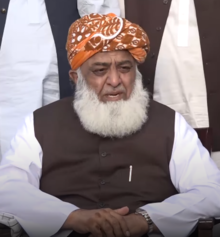
Back فضل الرحمن (سياسي) Arabic ফজলুর রহমান Bengali/Bangla Fazal-ur-Rehman (político) Spanish فضل الرحمان (سیاستمدار) Persian Fazal-ur-Rehman French फ़ज़ल-उर-रहमान (राजनीतिज्ञ) Hindi فضل الرحمان PNB فضل الرحمٰن (سیاست دان) Urdu
Fazal-ur-Rehman | |
|---|---|
فضل الرحمان | |
 | |
| Leader of the Opposition | |
| In office 25 March 2004 – 15 November 2007 | |
| President | Pervez Musharraf |
| Prime Minister | Shaukat Aziz |
| Preceded by | Benazir Bhutto |
| Succeeded by | Chaudhry Pervaiz Elahi |
| President of Pakistan Democratic Movement | |
| In office 20 September 2020 – September 2023 | |
| President of Muttahida Majlis-e-Amal | |
| Assumed office 20 March 2018 | |
| President of Jamiat Ulema-e-Islam (F) | |
| Assumed office 1980 | |
| Preceded by | Mufti Mahmud |
| Chairman of the Parliamentary Special Committee on Kashmir | |
| In office August 2013 – 31 May 2018 | |
| In office 16 September 2008 – 24 March 2013 | |
| President | Asif Ali Zardari Mamnoon Hussain |
| Prime Minister | Yousuf Raza Gilani Raja Pervaiz Ashraf Nawaz Sharif Shahid Khaqan Abbasi |
| Member of the Standing Committee on Foreign Affairs | |
| In office 2008–2013 | |
| Chairman of Standing Committee on Foreign Affairs | |
| In office 1993–1996 | |
| Member of the National Assembly of Pakistan | |
| Assumed office 29 February 2024 | |
| Constituency | NA-265 Pishin |
| In office 1 June 2013 – 31 May 2018 | |
| Constituency | NA-24 (D.I. Khan) |
| In office 17 March 2008 – 31 May 2013 | |
| Constituency | NA-26 (Bannu) |
| In office 18 November 2002 – 18 November 2007 | |
| Constituency | NA-24 (D.I. Khan) |
| In office 16 October 1993 – 5 November 1996 | |
| Constituency | NA-18 Dera Ismail Khan |
| In office 2 December 1988 – 6 August 1990 | |
| Constituency | NA-18 Dera Ismail Khan |
| Personal details | |
| Born | 19 June 1953 Abdul Khel, NWFP, Pakistan |
| Political party | Jamiat Ulama-e-Islam |
| Other political affiliations | Muttahida Majlis-e-Amal (MMA) (2002–2008) |
| Children | Asad Mehmood[1] |
| Parent |
|
| Relatives | Maulana Lutf ur Rehman (brother) Atta-ur-Rehman (brother) |
Fazal-ur-Rehman (Urdu: مولانا فضل الرحمان; born 19 June 1953) is a Pakistani politician who is the president of Jamiat Ulema-e-Islam (F).[2] He is also the president of the Pakistan Democratic Movement (PDM), a coalition of political parties which ousted then prime minister Imran Khan through a no-confidence motion in 2022. He has been a member of the National Assembly since February 2024 and previously served in that position between 1988 and 2018. He was also the Leader of the Opposition from 2004 to 2007. He is a supporter of the Taliban government in Afghanistan and has demanded for its international recognition.[3] In the 1980s, he was part of the Movement for the Restoration of Democracy (MRD), which was formed to end the military regime of General Zia-ul-Haq.[4]
Rehman is a pro-Taliban politician, known for his close ties to the Islamic Emirate of Afghanistan.[5][6][7] He has attempted to re-brand himself as a moderate without connections to religious extremists and hardliners.[5] In the past, he has called for imposition of Sharia in Pakistan. Being a follower of Mahmud Hasan Deobandi who campaigned for liberation against the British Raj but later restricted his members from armed struggle after establishing Political party Jamiat Ulema-e-Islam, Rehman opposed armed struggle to impose shariah laws as it leads to extremism in society.[8] When in power in Khyber Pakhtunkhwa from 2004 to 2007, his party passed the 'Hasba Bill' which was later declared illegal and unconstitutional.[9][10] Through this bill, he believed that he would be following in his father Mufti Mahmud's footsteps, as he tried to implement 'Nizam-e-Mustafa', which his father struggled for throughout his political life. However, it was declared unconstitutional by Chief Justice of Pakistan Iftikhar Chaudhry.[11]
After defeat in the 2018 Pakistani general election, Rehman was ejected from the National Assembly and failed to win major political support in Khyber Pakhtunkhwa, bagging only 10 of the 99 seats in his home turf. Alleging election fraud, 11 opposition political parties formed the Pakistan Democratic Movement (PDM) [12] appointing Rehman as the president of this movement.[13]
- ^ Hussain, Javed (7 August 2018). "MMA announces name of Fazl's son as nominee for NA deputy speaker post". DAWN.COM. Retrieved 8 August 2018.
- ^ "Anyone killed by US is a 'martyr': Fazlur Rehman". The Express Tribune. 5 November 2013. Retrieved 2 February 2021.
- ^ "Pakistan's Islamic parties push for Taliban recognition in Afghanistan". Deutsche Welle. 8 October 2021. Retrieved 28 April 2022.
- ^ "Maulana's style of politics". www.thenews.com.pk. Retrieved 13 January 2021.
- ^ a b Cite error: The named reference
dawn/herald2008was invoked but never defined (see the help page). - ^ Cite error: The named reference
bbc/6nov2002was invoked but never defined (see the help page). - ^ Cite error: The named reference
theguardian/30nov2010was invoked but never defined (see the help page). - ^ "Armed struggle for Shariah enforcement un-Islamic: Fazl". www.thenews.com.pk. Retrieved 13 January 2021.
- ^ Hussain, Shahid (2005). "State's ruling alliance passes Hasba Bill". Gulf News.
- ^ "Text of Hasba bill". DAWN.COM. 16 July 2005. Retrieved 13 January 2021.
- ^ "Supreme Court Blocks Hasba Bill". All Things Pakistan. 15 December 2006. Retrieved 13 January 2021.
- ^ "Politics of alliances and PDM". The Express Tribune. 8 December 2020. Retrieved 13 January 2021.
- ^ "Maulana Fazl unanimously appointed PDM chief". The Express Tribune. 3 October 2020. Retrieved 13 January 2021.